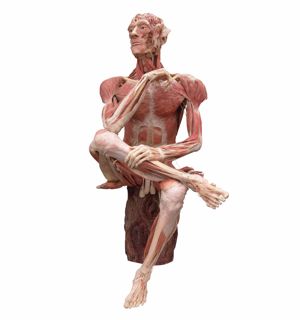SciJourn found the answers to the question, What Can You Learn from Dead Bodies, at Body Worlds and the Brain, a new exhibit at the Saint Louis Science Center.

Body Worlds and the Brain shows various body structures and the development of the human body and brain. The bodies were donated from people who have legally agreed to provide their bodies after death to the Gunther Von Hagens Institute in Heidelberg, Germany.
Body Worlds presents bodies and organs preserved through a process called plastination. Invented by Body Worlds creator Gunther von Hagens, plastination helps the bodies stand and retain their positions. Plastination allows Body Worlds to feature figures including a skinless baseball player, yoga lady, ballet dancer, and even a pregnant woman.
Plastination makes it possible to preserve individual tissues and organs that have been removed from the body of the deceased, as well as the entire body. “Dissection and Plastination of an entire body requires about 1,500 working hours and normally takes 1 year to complete,” according to the Body Worlds website.
Body Worlds has over 30 displays of body positions, and organs. These exhibits showed exposed kneecaps, collarbones, skin tissue and many other organs including the brain and the central nervous system.
Two displays stand out and deserve special attention, in this reviewer's opinion.
Elegance of Ice shows a male and female figure skating pair. The male holds the female by her hand while the female’s body stretches out. This gives the viewer a chance to see how the muscles react when they are stretched out in this position. The figure skater showcased biceps, thigh and deltoid muscles.
The exhibit on the human lungs features a nonsmoker’s, smoker’s and coal miner’s lung. The nonsmoker’s lung is mostly white with a few black dots throughout because of the dust and daily things that we breath throughout the day. The smoker’s lung is a dark gray color with a few white spots because of the tobacco they smoke. The coal miner’s lung is pitch black because of the environment that the lung is in everyday. (According to the National Cancer Institute, “lung cancer is the leading cause of cancer of death both among men and woman in the United States, and 90% of the lung cancer death among woman and men were due to smoking.” )
Body Worlds and the Brain is worth the time to go see and learn new things. It will be at the Saint Louis Science Center until the Fall 2011.

This work is licensed under a Creative Commons Attribution-NonCommercial-NoDerivs 3.0 Unported License












Good article i will be checking body worlds soon.
good article it might help me in the fure
Wow I want to see the bodies then… The pregnant woman though kind of creeps me out… :wah :arhh
I kind of knew about this stuff just not all the detailes
This was a really good article. I’ve learned many things about the dead bodies of human beings. Well more than what I knew before I read this article.
This is a good article! This tells people that it’s not a bright idea to smoke. DON’T SMOKE!